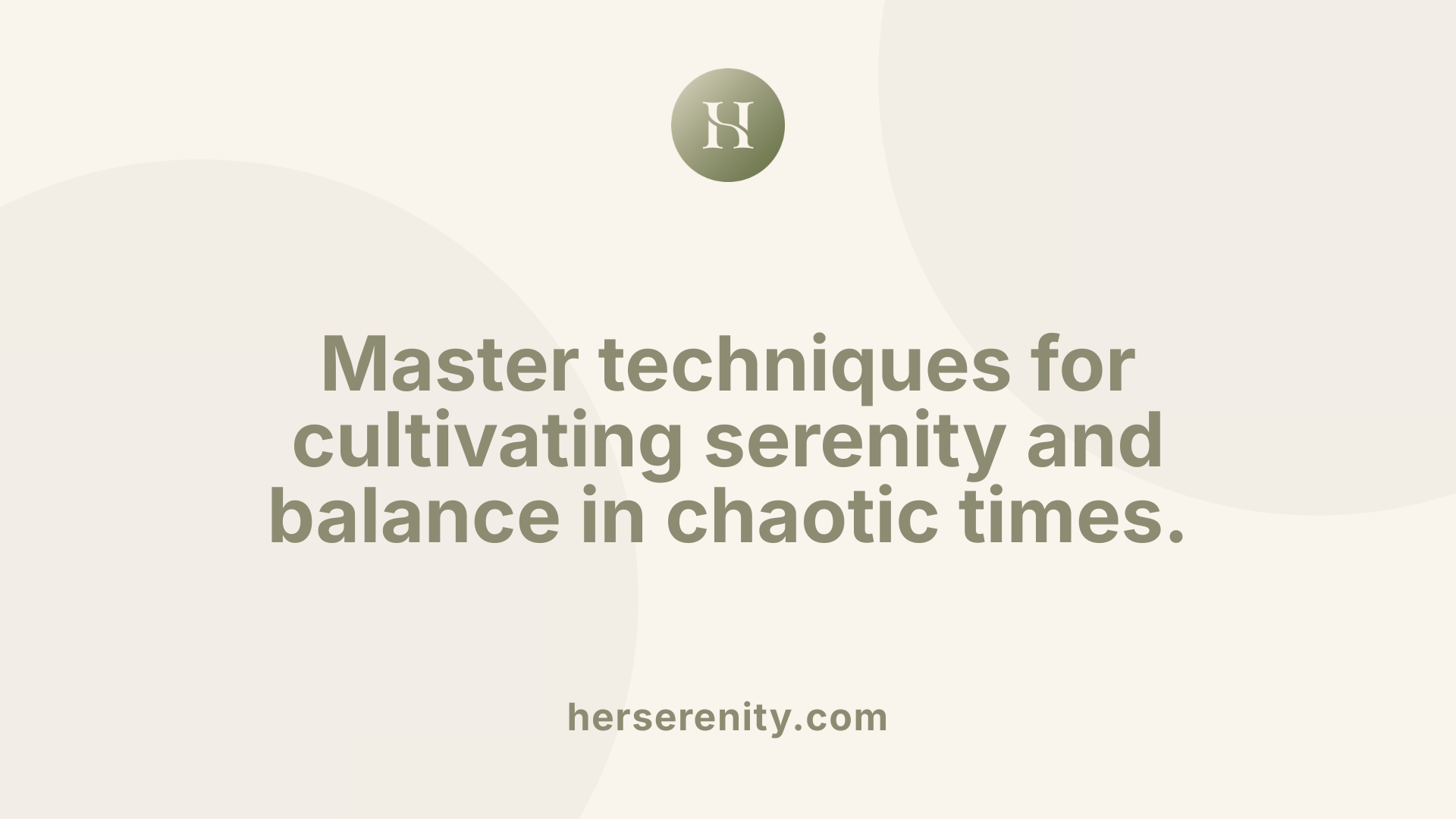How to Use Serenity to Navigate Change with Ease
Harness the Power of Serenity for Life's Transitions

Embracing Serenitiy in Daily Life
In the midst of life's unpredictable changes and challenges, serenity stands as a vital pillar of emotional resilience. Rooted in the timeless Serenity Prayer, the concept of serenity encompasses the acceptance of things we cannot change, the courage to act on things we can, and the wisdom to know the difference. This article will guide you on how to cultivate serenity and apply it effectively in navigating life's transitions with grace and calm.
The Essence of the Serenity Prayer

What is the meaning of the Serenity Prayer?
The Serenity Prayer, attributed to theologian Reinhold Niebuhr, embodies a philosophy of acceptance, courage, and wisdom in the face of life's challenges. It calls for the serenity to accept unchangeable situations, courage to make necessary changes, and the wisdom to discern between the two.
This powerful mantra forms a cornerstone in recovery settings like Alcoholics Anonymous, where it aids individuals in managing anxiety and fostering personal growth. The prayer encourages a shift in perspective, inviting individuals to see hardships as opportunities for growth instead of insurmountable barriers.
Role in navigating life's challenges
In applying the Serenity Prayer, practitioners cultivate a mindset focused on personal responsibility and resilience. By reinforcing the idea that individuals can control their reactions and decisions, it enhances their ability to cope with stress and life’s unpredictability. The prayer’s emphasis on self-acceptance fosters emotional stability, empowering individuals to maintain peace in chaotic moments.
These principles not only nurture an individual’s well-being but also promote shared experiences and cohesion in community settings, like support groups. By strengthening connections through common struggles, the Serenity Prayer serves as a unifying force, enhancing both personal healing and collective growth.
Applying the Serenity Prayer in Everyday Life

How do you use the Serenity Prayer in everyday life?
Using the Serenity Prayer in everyday life involves a thoughtful approach to its three core components: serenity, courage, and wisdom. This prayer encourages individuals to accept what cannot be changed, such as past actions or unchangeable circumstances, helping to foster a sense of peace amidst life's challenges.
Practicing mindfulness techniques, such as meditation and deep breathing, reinforces this acceptance. These practices allow for a more focused and calm mindset, helping individuals navigate emotional turmoil with ease. By embracing the principle of serenity, one can learn to maintain tranquility even when faced with chaos.
The prayer also urges individuals to find the courage to change what they can. This empowers them to take positive actions in their lives, whether it's making lifestyle changes, improving relationships, or overcoming obstacles. A proactive stance can lead to personal growth and a greater sense of control over one’s environment.
Finally, developing the wisdom to discern between what can and cannot be changed is crucial for effective decision-making. This discernment leads to reduced anxiety and promotes a healthier mindset, allowing individuals to respond to challenges with clarity and confidence. By incorporating these principles of the Serenity Prayer daily, individuals cultivate a more peaceful and resilient life.
Mindfulness Meditation: Cultivating Serenity Within

Role of meditation in developing acceptance and peace
Mindfulness meditation plays a vital role in cultivating a state of serenity. By practicing mindfulness, individuals learn to focus on the present moment, which fosters acceptance of current circumstances. This practice aligns closely with the principles outlined in the Serenity Prayer, promoting a sense of calm and awareness of what can and cannot be changed.
Engaging in mindfulness meditation empowers individuals to release anxieties about the past or future, enabling them to find peace in their current state. Over time, this practice nurtures emotional resilience, making it easier to navigate life's challenges without succumbing to stress.
Techniques for mindfulness
Various techniques can enhance mindfulness meditation, helping individuals achieve tranquility:
- Breath Awareness: Paying close attention to your breath helps ground you in the moment, promoting relaxation.
- Body Scan: This technique involves systematically focusing on different body parts, releasing any tension and nurturing acceptance of your physical state.
- Guided Meditation: Using recorded guidance can help beginners effectively follow along, leading them toward a serene mindset.
- Visualization: Picture yourself in a peaceful setting, which can encourage feelings of serenity and joy.
- Gratitude Journaling: Writing down things you are grateful for promotes positive thinking, enhancing emotional well-being.
Incorporating these techniques into a daily routine fosters a deeper connection with oneself and nurtures inner tranquility. Studies show that consistent practice can significantly lower stress levels and improve overall mental health.
The Power of Acceptance: Embracing the Unchangeable
Psychological Benefits of Acceptance
Accepting what cannot be changed serves as a powerful antidote against anxiety and stress. This process fosters a sense of inner peace, allowing individuals to release their struggles concerning the past or uncertain futures. By embracing acceptance, people break free from the mental chains of resistance, which often escalate feelings of frustration and helplessness. This state of calmness, akin to navigating stormy seas with grace, helps cultivate emotional stability in tumultuous situations.
Moreover, recognizing and embracing the reality of our limitations can enhance self-awareness. With a clearer understanding of what lies beyond our control, we redirect our focus to areas where we can make a difference. This empowerment boosts confidence and nurtures personal growth, aligning with the principles found in the Serenity Prayer.
How Serenity Aids in Stress Reduction
The practice of serenity allows individuals to manage stress more effectively by encouraging mindfulness in daily life. Through techniques such as meditation and self-compassion, one can cultivate a tranquil mindset that buffers against external chaos. For instance, by focusing on the breath or engaging in positive self-talk, individuals ground themselves amidst challenges, facilitating emotional resilience.
In chaotic environments—work, home, or while driving—simply invoking the Serenity Prayer can shift one’s perspective, reducing stress and prompting a more composed approach to confront difficult situations. By embracing the present and letting go of what we cannot change, individuals foster a peaceful inner atmosphere vital for navigating life's inevitable transitions.
Courage to Change: Taking Practical Steps

Developing Courage to Make Life Changes
Courage is essential when it comes to effecting change in one’s life. It’s about stepping outside of comfort zones to embrace new opportunities and challenges. The first step to building courage involves recognizing that change often sparks discomfort, a natural part of personal growth.
Acknowledging fears—whether they are related to failure, rejection, or the unknown—allows individuals to confront and work through these feelings. Reflecting on past accomplishments can also serve as a reminder of your capabilities and resilience, reinforcing your courage.
Actionable Strategies for Personal Growth
To systematically foster courage, consider these practical strategies:
- Set Smaller Goals: Break larger, daunting tasks into manageable steps. Small, achievable goals can boost confidence and create a sense of progress.
- Seek Support: Engage with friends, mentors, or support groups. Sharing goals and challenges can provide accountability and encouragement.
- Practice Self-Compassion: Treat yourself kindly during moments of doubt. Recognizing that everyone struggles can ease pressure and build resilience.
- Visualization Techniques: Envisioning successful outcomes can enhance motivation and instill a commitment to action.
Embracing these strategies in daily life can empower you to take courageous steps toward meaningful change, fostering personal growth and resilience.
The Wisdom to Know: Discerning Controllable from Uncontrollable
Developing Discernment
Discernment involves the ability to recognize what aspects of our lives we can change and what we must accept. This skill is crucial for maintaining emotional stability, especially during turbulent times. The Serenity Prayer emphasizes the importance of this understanding, guiding individuals to focus their efforts on controllable factors rather than getting lost in worry about the uncontrollable.
To cultivate discernment, one can engage in reflective practices such as journaling or mindfulness meditation. These activities not only enhance self-awareness but also help clarify personal values and responses to challenging situations. By acknowledging limitations and focusing on personal actions, individuals can foster a sense of empowerment and peace.
Impact of Discernment on Emotional Health
Practicing discernment positively affects emotional well-being. By learning to differentiate between changeable and unchangeable elements, individuals can reduce anxiety and stress. This practice encourages a proactive mindset, enabling one to take responsibility for actions they can control, such as responses to adversity or decisions in relationships.
Incorporating discernment into daily life cultivates resilience. It fosters a sense of community by allowing individuals to share their insights with others. This communal support can provide strength during difficult times, reinforcing the notion that while we cannot control every circumstance, we can control our reactions to them.
Emotional Resilience: Strengthening Your Inner Peace
Building resilience through serenity
Building emotional resilience is deeply intertwined with the practice of serenity. The Serenity Prayer emphasizes acceptance, courage, and wisdom, enabling individuals to navigate the chaotic waters of life. By accepting what cannot be changed, people learn to relinquish control over external circumstances that often cause stress.
Incorporating mindfulness and self-awareness allows individuals to focus inward, promoting personal growth. Techniques such as gratitude journaling or intention-setting help shift perspectives from negativity to positivity. Practicing self-compassion and treating oneself kindly fosters a more resilient mindset.
Importance of resilience in change
Resilience is especially vital during periods of change. Embracing uncertainty can be daunting, but with serenity, it becomes an opportunity for growth. Individuals who apply the principles of the Serenity Prayer often find they can approach challenges with a sense of calm.
Having a support system amplifies resilience, providing emotional resources in tough times. Aligning behaviors with personal values facilitates a more stable inner landscape, offering clarity amidst turmoil. Ultimately, fostering resilience through serenity cultivates an empowered mindset, equipping individuals to thrive even when faced with life’s unpredictability.
The Mindset of Self-Awareness in Navigating Change
Improving Self-Awareness
Self-awareness is crucial when navigating change. Recognizing one's emotions and triggers can empower individuals to react thoughtfully rather than reflexively. Key practices include mindfulness meditation, which helps cultivate inner peace and clarity of thought. Journaling is another effective method to process feelings, allowing one to reflect on experiences and identify patterns.
Engaging in gratitude journaling also shifts focus from challenges to positive aspects of life. By routinely noting things you are thankful for, you create a mindset of abundance that enhances emotional resilience.
Changing Mindset for Personal Growth
Adopting a growth mindset is vital for embracing change. Instead of viewing obstacles as setbacks, individuals can see them as opportunities for learning and evolution. This shift in perspective encourages resilience and fosters the courage to change what is within reach.
For instance, breaking down goals can turn overwhelming ambitions into manageable steps, enabling progress while celebrating small achievements. A commitment to personal growth and the willingness to explore one's own responses to change lay the foundation for lasting transformation.
Overview of Mindfulness Techniques
| Technique | Description | Purpose |
|---|---|---|
| Mindfulness Meditation | Focus on the present moment and breathing | Reduces anxiety and promotes calm |
| Journaling | Writing thoughts and emotions | Enhances self-reflection |
| Gratitude Journaling | Listing things to be grateful for | Shifts focus to positive experiences |
By consistently applying these self-awareness practices, individuals develop greater emotional stability, enabling a serene approach to life's transitions.
Strategies for Staying Calm and Balanced

Practical Steps for Achieving Calmness
To cultivate serenity in daily life, there are several practical strategies individuals can adopt. Integrating the Serenity Prayer into your routine promotes acceptance and encourages mindfulness. Reciting the prayer can center you, fostering emotional resilience when facing challenges.
- Practice Mindfulness: Engage in mindfulness meditation to enhance clarity and focus, allowing you to differentiate between what can be changed and what cannot.
- Set Intentions: Start each day with a clear intention, which can provide direction and promote a positive mindset.
- Break Goals into Steps: Setting achievable milestones can streamline tasks and build a sense of accomplishment, further reducing stress.
- Develop Self-Compassion: Treat yourself kindly rather than critically. This mindset fosters self-acceptance and enhances coping mechanisms during tough times.
Balancing Emotions Amidst Chaos
Navigating life's ups and downs requires a delicate balance of emotions. Here are some techniques to remain grounded:
- Recognize Control: Focus on your actions and responses—your emotional reactions are within your power despite external circumstances.
- Engage in Self-Care: Regular activities like exercise, adequate sleep, and relaxation techniques provide essential support, helping you maintain emotional equilibrium.
- Cultivate Support Networks: Surround yourself with supportive individuals who promote positivity and help anchor you during turbulent periods.
- Maintain a Gratitude Journal: Acknowledge positive experiences to shift attention from negativity and enhance emotional well-being.
By implementing these strategies, you can foster serenity and remain balanced amidst life's inevitable chaos.
Personal Growth Through the Principles of Serenity
Benefits of Adopting Serenity Principles
Adopting the principles found in the Serenity Prayer—serenity, courage, and wisdom—can significantly impact personal growth. This framework encourages individuals to accept what cannot be changed and empowers them to take action where possible. By doing so, people can cultivate inner peace, reduce stress, and improve their decision-making skills, which are crucial in navigating life’s challenges.
Personal Improvement Strategies
To incorporate these principles into daily life, individuals can practice several strategies:
- Mindfulness Meditation: Engage in meditation to enhance awareness of thoughts and feelings, helping to strengthen acceptance of the present moment.
- Self-Care Routines: Regularly dedicate time to self-care practices like exercise and journaling; these habits foster emotional well-being.
- Building a Support Network: Surrounding oneself with supportive and like-minded individuals provides emotional resilience and reinforces feelings of serenity.
- Practice Gratitude: Keeping a gratitude journal shifts focus from negative to positive aspects of life, enhancing emotional stability.
Utilizing these techniques can lead to substantial personal growth, enriching lives and enabling individuals to handle uncertainties with calm and poise.
Philosophical Insights into Emotional Stability
Exploring Philosophical Guidance
Philosophy often provides invaluable insights for emotional stability, particularly in navigating life's inevitable changes. The principles of the Serenity Prayer—acceptance, courage, and wisdom—serve as foundational elements. Embracing acceptance encourages individuals to differentiate between what can and cannot be changed, offering a framework that alleviates stress and anxiety.
Moreover, self-awareness and reflection are critical in recognizing personal limits. When people understand their sphere of control, they can make conscious choices rather than reacting impulsively to external pressures. This acceptance releases the burden of trying to change uncontrollable aspects of life.
Finding Stability During Transitions
Transitions can be particularly challenging, but incorporating philosophical teachings can promote stability. Engaging in mindfulness practices helps individuals live in the present moment, reducing anxiety associated with uncertainties. A growth mindset enhances this process, allowing people to perceive challenges as opportunities for self-improvement.
Additionally, surrounding oneself with supportive relationships fosters resilience and emotional clarity. The practice of gratitude shifts focus from negativity to positive aspects, further grounding oneself amid chaotic changes. By embracing philosophical wisdom, individuals can cultivate serenity and navigate life's transitions more effectively.
Actionable Insights from Experts on Navigating Change
Expert Advice for Embracing Change
Experts emphasize the importance of adopting a growth mindset when facing life transitions, viewing challenges as opportunities for learning and self-improvement. This perspective not only fosters resilience but also encourages individuals to take actionable steps toward their personal goals. Practical strategies include:
- Mindfulness Practices: Engaging in mindfulness and meditation helps individuals focus on the present, easing anxiety about the future and facilitating acceptance of change.
- Establishing Routines: Maintaining a consistent daily schedule, including sleep patterns, can provide stability amid uncertainty.
- Journaling: Writing down thoughts and feelings creates clarity and promotes emotional processing, allowing for a more tranquil response to stressors.
Positive Approaches to Life Transitions
Navigating changes, especially during times of crisis, requires a proactive approach. Incorporating self-care and positive relationship-building into daily life can significantly enhance one’s emotional well-being. Key practices include:
- Seeking Support: Building a strong network of family and friends provides essential emotional support. Sharing experiences within recovery groups can foster a sense of belonging and community.
- Practicing Gratitude: Keeping a gratitude journal can shift focus from negative situations to positive experiences, empowering individuals to embrace their circumstances.
- Self-Compassion: Treating oneself kindly during challenging times nurtures resilience and prepares individuals to handle obstacles with grace.
Fostering Serenity for a Graceful Life Journey
Navigating change with ease involves embracing serenity not just as a fleeting state of calm, but as a deliberate practice woven into the fabric of daily life. By integrating the principles of the Serenity Prayer—acceptance, courage, and wisdom—into our mindset and decision-making process, we can build resilience, emotional stability, and a life rich with purpose. Embracing serenity empowers us to face life's challenges with poise, ensuring that we not only endure transitions but thrive through them.
References
- What is the Serenity Prayer and How Can It Help You Stay Calm?
- Blog – Finding peace and clarity through the serenity prayer
- Finding The Serenity To Accept The Things We Cannot Change
- Serenity in Action: Focusing on What You Can Control
- Using Serenity to Navigate the Waves of Life - - You Matter
- The Serenity Prayer: Short and Long Versions Explained - Chmeetings
- How to Live With Serenity (The Key to More Peace and Less Suffering)






























































































